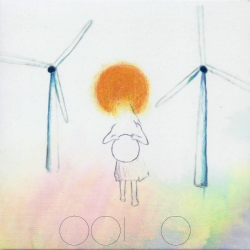
OOIOO
Armonico Hewa
(Avex/Thrill Jockey; 2009)
By Mark Abraham | 28 October 2009
Armonico Hewa takes the excellence of 2006’s already phenomenal Taiga and refines it to the point where it seems like the band’s music is trying less to be music than it is to be Dilaudid. Every song here triggers giant smiles with Yet Another 180 that conjures up Yet Another Perfect Approximation Of [Insert Genre Here]. Now with Whitney Houston-style key changes. OOIOO are like the best possible version of Girl Talk, except they just write everything like you’ve heard it your entire life. Just listen to that ludicrous guitar solo on “O O I A H.” Or the weird New Romantic/funk/ethnic folk hybrid of “Agacim.” Or the weird inverted post-rock guitar lines of “Irorun.” Or this:
“La! La! La! Ooh! La! Ooh! La! Ooh! La! La! Ah! Ah! Ah!”
I mean, that’s what the lyrics of “Uda Hah” look like written out phonetically, except imagine them grappling like pincers on a thrumming beat featuring guitar chunks and shards of awesomeness spilling through the mix. Hell, the grimy parts of the song make that new Flaming Lips album look like a Lite-Brite…sorry Joel. Plus, Ai’s drumming here—and everywhere—is so sophisticated that she should get a Nobel Peace Prize. Her collapse of every ethnic rhythm imaginable into such gorgeous, ferocious beats is more impressive than any speech Barack Obama has ever given. That high hat on “Irorun” is telling you about the world’s problems. Meanwhile, Yoshimi, Kayan, and Aya all act like their instruments and their voices are just more percussion, and so bass and guitar and vocals and keyboards are just more jagged objects looking for an interstitial space to land, propelling this sound forward. This is a band in total harmony; a band that names their album a Spanish/Swahili portmanteau to reflect the way their music is just one giant, unending, cyclic portmanteau of musical ideals; and a band that constantly rocks while doing so. Uh, let’s stop referring to OOIOO as Yoshimi’s side project, ‘kay? Whatever the Boredoms may or may not do in the future, OOIOO is utterly working their shit in the present.
Last time I reviewed OOIOO, I talked a lot about how the individual songs sounded beat to beat. I feel less motivation to do that now: there’s all the stuff you’d expect, after all. There’s the fucked up OOIOO pop-take “SOL”; there’s the brittle Sonic Youthish “Uda Hah”; there’s the J-Pop bluegrass breakdown “Konjo”; there’s the no wave Ut-like skittle-vocalled “Irorun”; there’s the Brain Salad Surgery intro to the beautiful ballad “Ulda”; there’s the Prince/Fela Kuti/giant head fuck of “Polacca”; at this point, you’ve only made it through the first half of the album. Hell, there’s even a song called “Honki Ponki” that sounds exactly like the title suggests it might sound. Most genius thing all year. Except possibly for all the hilarious classic rock power chord moments on the album that frequently dissolve into funny little synth squiggles. Or “Kipepeo,” which kind of sounds like OOIOO poking a little fun at indie rock in general.
I mean, that’s what is really exciting about this band, right? They throw all these genres into a stew, ladle a sense of humor on top, and work it. But the inversion, what’s so masterful, and what separates OOIOO from a host of other bands that do this kind of Let’s Transform Genre X Into Dance Music stuff—OOIOO makes every hipster dance band look amateur—is that it never really seems like OOIOO is trying to live or die by the cache they get from their influences. They are not, say, an indie rock band that exploits African sounds; they are a genreless band that plays everything, all the time. And make most of it sound like Prince on acid backed by King Crimson. This is punk music at its finest, re-articulating a million ideas into a coherent sound that is inimitable, fun, and really, really good. And while it superficially bears the ADD that stuff like Girl Talk wears like a badge, OOIOO transforms what could be mush into wonderful, brilliant songs that fold and mutate the ideas they’re based on into moving and coherent narratives.
For example, when the stilted, hard-nosed “Irorun” dissolves into the cheery, delicate “Konjo” there’s no attempt to emphasize the disruption, or to cash in on the willingness of the band to play either tune. When “O O I A H” smashes out of “Kipepeo,” they use the same guitar chords to emphasize the continuity between the two songs. OOIOO has evolved to the point where all of these styles of music mean exactly the same thing, a toolbox from which they can knit together a disparate set of ideas into the smooth, sharp, and undulating noise that is their music. And then just for fun they throw random noises, backwards samples, didgeridoos, synth cadences, and a spate of percussion on top of that. The last 2 minutes or so of “Polacca” seem to emphasize that idea: the only truly chaotic part of the album, this bit sounds exactly what it might sound like if you threw everything but the kitchen sink into a song. The rest of the album is a stunning testament to how masterful this band is at poking around inside that mess and extracting some of the fiercest grooves imaginable.





